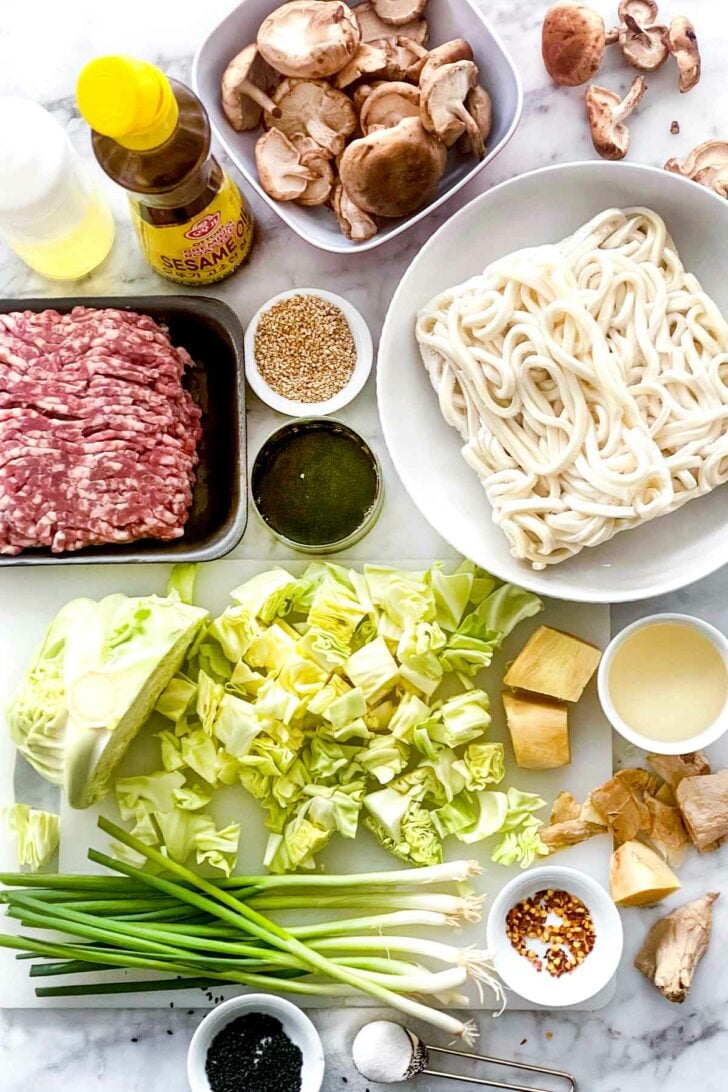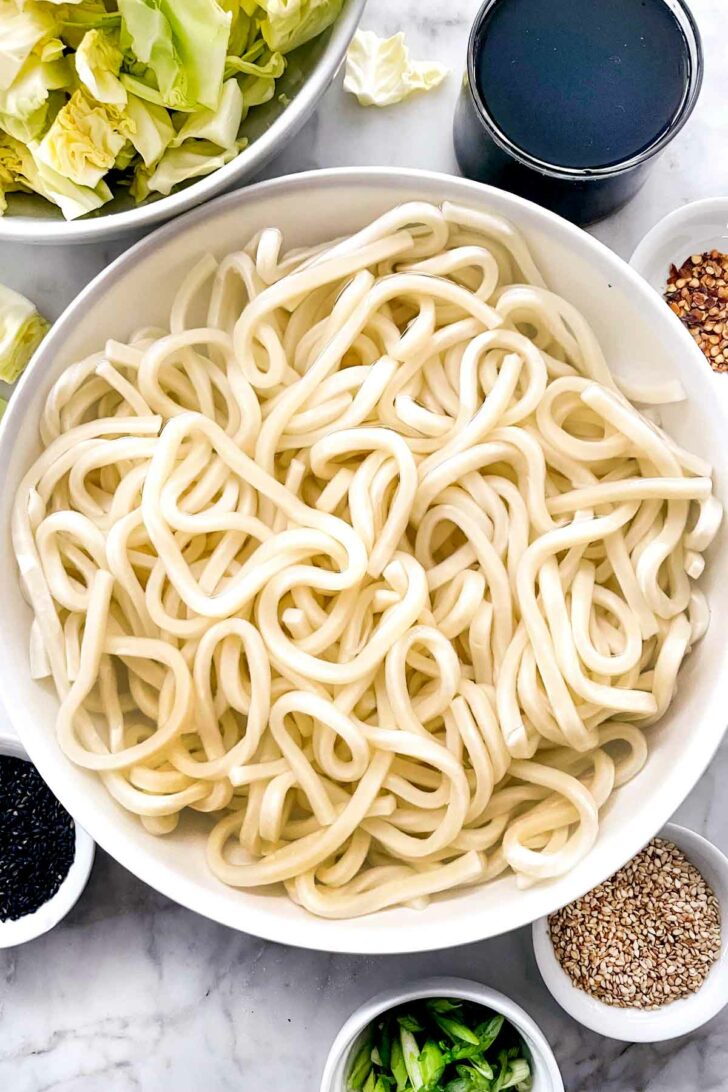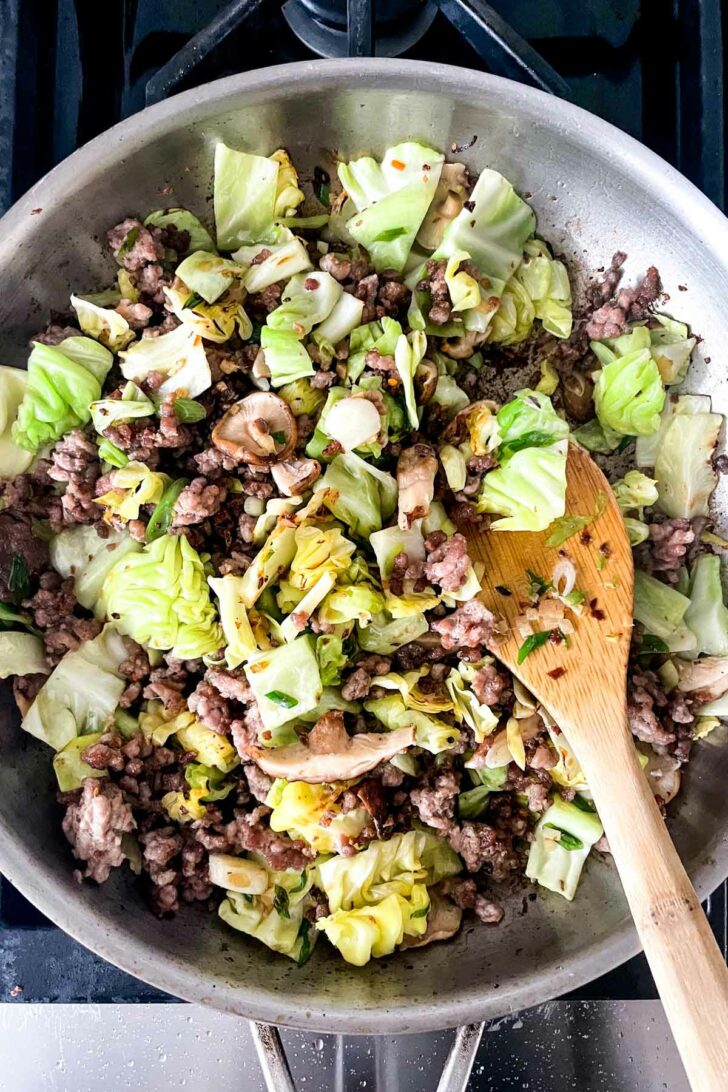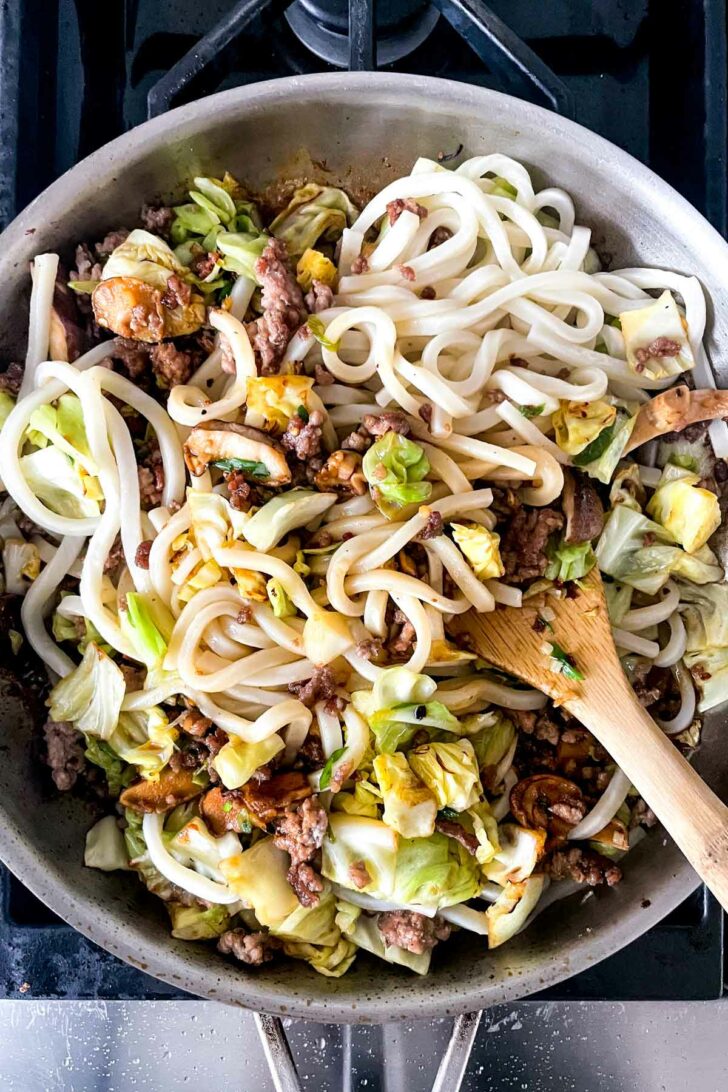This quick udon stir fry recipe with sausage, cabbage, and shiitake mushrooms is a fast yaki udon noodle dinner full of savory slurpable flavor.

Ramen noodles have definitely been having their heyday, but when I have my choice, it’s udon noodles all the way. I prefer udon’s thick, chewy texture that perfectly slithers between my lips as I slurp. But udon isn’t meant to be eaten only as a soup in broth. Like soba noodles or vermicelli, it’s awesome in Asian dishes as a swap for rice. So when I spied a recipe for stir-fried udon in an issue of Bon Appétit a few years back, I tried it and have been re-making and tweaking it ever since. In my version, I use fresh noodles instead of packaged, add more pork plus more cabbage for more crunch, add mushrooms because I looove them, and make the sauce with seasoned rice vinegar instead of mirin. I’ve also switched up the cooking order of the ingredients to streamline it and make it easier. You could call this recipe an evolution rather than an overhaul. I just call it GOOD!

In This Post
What’s in Udon Stir Fry
- Udon noodles — I buy fresh udon but you can also use frozen. I like them both better than the type sold in soup packs that tend to be a little rubbery.
- Ground pork
- Kosher salt
- Red pepper flakes
- Fresh ginger — look for a thick knob that’s easy to peel
- Cabbage — choose any style cabbage you like best. I prefer basic green cabbage for its sturdy bite
- Shiitake mushrooms — or use brown cremini mushrooms
- Green onions
- Sugar
- Soy sauce
- Seasoned rice vinegar
- Sesame oil
- Sesame seeds
What is Yaki Udon
Yaki Udon is a Japanese stir-fried dish made with wheat-based udon noodles, vegetables and a protein like ground pork dressed in soy sauce, sesame oil, and mirin or rice vinegar sauce.

The Best Noodles for Stir-Fried Udon
Japanese udon noodles are made with wheat flour, water, and flour. When made from scratch, they have a reputation for being challenging to work with so they’re often found sold fresh, frozen, or packaged with a soup base similar to ramen.
Choose fresh or frozen udon noodles for the best pliability and texture. You can certainly use the supermarket udon noodles found packaged with a soup base, but for stir-fried udon, I skip those as they tend to be rubbery and are harder to get to relax from their packaged shape. Find fresh or frozen udon at Asian grocery stores. Or if needed, use the packaged soup variety and discard the broth packet.
If you’re feeling extra ambitious, try making your own udon noodles from scratch.
Soak the udon noodles for a few minutes so they relax. Soak the noodles in hot water to thaw, or if using fresh, soak them in warm water to remove the chill so they become pliable and bendy. Drain before using.

How to Make a Delicious Udon Stir Fry
First, cook the ground pork. Because ground pork is fatty, I don’t use extra oil here. Place the pork in a cold pan over medium-high and season with kosher salt and red pepper flakes. I like the pork chunky and crispy so cook it undisturbed and wait to stir it until it really gets sizzling and browns. Remove from the skillet and set aside.
Cook the cabbage, mushrooms, and ginger in the same pan. Drizzle a little oil in the pan before adding the vegetables. As the mushrooms and cabbage cook, they’ll release moisture that helps lift those chunky bits of porky flavor from the skillet as you stir.
Add the pork back to the skillet with the sauce. Combine the soy sauce, rice vinegar, and sesame oil and toss with the pork to combine. Cook for 1-2 minutes to thicken.

Combine the Noodles and Flavor Chunks
Stir in the chewy noodles. This is where the Asian flavors really bring the separate elements together. Cook for a minute or two for the noodles to absorb the sauce and caramelize the cabbage’s sweetness.
Finish with chopped scallions and sesame seeds. This final step adds a final pop of color and freshness with another layer of nutty sesame to seal the deal.
Substitutions and Additions
- If you don’t have seasoned rice vinegar, try regular rice vinegar with 2 teaspoons sugar or an equal amount of mirin (sweetened Japanese rice wine)
- Instead of ground pork, try a plant-based substitute or ground turkey cooked in 2 tablespoons of canola or grapeseed oil.
- Add more vegetables like water chestnuts, other varieties of mushrooms, chopped bok choy, chopped swiss chard or spinach, a little garlic, carrot, broccoli, or bell pepper
- Use different varieties of mushrooms like cremini, sliced portobello, maitake, oyster, or chanterelles

More Stir Fry Recipes
- Pad Thai
- Cashew Chicken
- Caramelized Salmon Stir Fry
- Teriyaki Tofu and Broccoli Stir Fry
- Thai Garlic and Black Pepper Tofu with Mushrooms
- Beef with Broccoli
Udon Stir Fry (Yaki Udon)
Ingredients
- 18 ounces udon noodles fresh or frozen
- 1 pound ground pork
- ½ teaspoon kosher salt
- ½ teaspoon red pepper flakes
- ¼ cup minced peeled ginger
- 6 cups roughly chopped cabbage
- 4 ounces shiitake mushrooms thickly sliced
- 5 green onions white and green parts thinly sliced
- ⅓ cup soy sauce
- ⅓ cup seasoned rice vinegar
- 2 tablespoons sesame oil
- 1 tablespoon sesame seeds
Instructions
- Place the udon in a large bowl and cover them with enough boiling water to thaw frozen udon or warm fresh udon. Drain the noodles and set aside.
- Add the pork to a large skillet and bring to medium-high heat. Season with red pepper flakes and kosher salt. Use a spatula to break the pork into large chunks and cook undisturbed until the pork is sizzling and browning on the bottom, about 4-5 minutes. Stir the ginger into the pork and cook for another 4 minutes or until the sausage is well browned. Transfer the pork to a bowl with a slotted spoon to reserve the rendered fat in the skillet.
- Add the cabbage and mushrooms with half of the green onion to the same skillet on medium-high. Cook until the cabbage caramelizes and softens with the mushrooms, about 3-4 minutes. Stir in the noodles and toss with the pork. Whisk the soy sauce, rice vinegar, and sesame oil in a small bowl or jar and pour over the noodles. Toss to coat well and cook for 1-2 more minutes for the saucy flavors to absorb into the noodles and pork. Sprinkle with the rest of the green onion and the toasted sesame seeds and enjoy.






